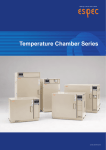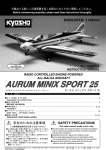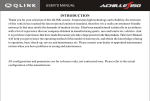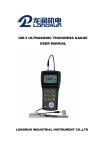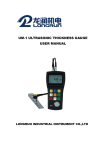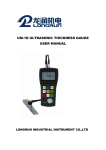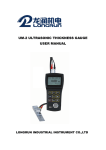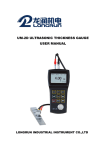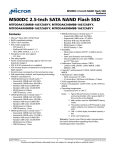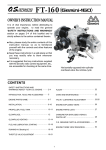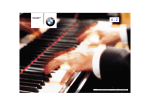Download Generac MAX-12CV-X User's Manual
Transcript
It is of vital importance, before attempting to
operate your engine, to read the general
'SAFETY INSTRUCTIONS AND WARNINGS'
section on pages 2-5 of this booklet and to strictly
adhere to the advice contained therein.
●
Also, please study the entire contents of this
instruction manual, so as to familiarize yourself
with the controls and other features of the
engine.
●
Keep these instructions in a safe place so that
you may readily refer to them whenever
necessary.
●
It is suggested that any instructions supplied
with the vehicle, radio control equipment, etc.,
are accessible for checking at the same time.
CONTENTS
SAFETY INSTRUCTIONS AND
WARNINGS ABOUT YOUR O.S. ENGINE
INTRODUCTION, BASIC ENGINE PARTS
2~5
IF THE ENGINE FAILS TO START
6
FINAL ADJUSTMENT
16~17
17~18
INSTALLATION
7~8
CARBURETTOR CLEANLINESS
AIR CLEANER TYPE102
8 ~9
CARE AND MAINTENANCE
NOTES CONCERNING
THE RECOIL STARTER
9~10
16
19
EXPLODED VIEW &
ENGINE PARTS LIST
20~23
CARBURETOR EXPLODED VIEW
& PARTS LIST
24~25
GLOWPLUG
10~11
TOOLS, ACCESSORIES, etc.
11~12
CARBURETTOR CONTROLS
12~13
O.S. GENUINE PARTS &
ACCESSORIES
26
13
THREE VIEW DRAWING
27
PRESSURIZED FUEL SYSTEM
STARTING THE ENGINE &
RUNNING-IN('Breaking-in)
14~15
1
SAFETY INSTRUCTIONS AND WARNINGS ABOUT YOUR O.S. ENGINE
Remember that your engine is not a "toy", but a highly efficient internalcombustion machine whose power is capable of harming you, or others, if it is
misused.
As owner, you, alone, are responsible for the safe operation of your engine, so act
with discretion and care at all times.
If at some future date, your O.S. engine is acquired by another person, we would
respectfully request that these instructions are also passed on to its new owner.
The advice which follows applies basically to ALL MODEL ENGINES and is
grouped under two headings according to the degree of damage or danger
which might arise through misuse or neglect.
NOTES
WARNINGS
These cover the many other
possibilities, generally less obvious
sources of danger, but which, under
certain circumstances, may also
cause damage or injury.
These cover events which
might involve serious (in
extreme circumstances, even
fatal) injury.
2
WARNINGS
• Never operate your engine in an enclosed space. Model engines, like
automobile engines, exhaust deadly
carbon-monoxide. Run your engine
only in an open area.
• Model engine fuel is poisonous. Do not allow it to
come into contact with the
eyes or mouth. Always
store it in a clearly marked
container and out of the
reach of children.
• Model engines generate
considerable heat. Do not
touch any part of your
engine until it has cooled.
Contact with the muffler
(silencer), cylinder head
or exhaust header pipe, in
particular, may result in a
serious burn.
• Model engine fuel is also
highly flammable. Keep it
away from open flame,
excessive heat, sources of
sparks, or anything else
which might ignite it. Do not
smoke or allow anyone else
to smoke, near to it.
3
NOTES
• This engine is intended for model cars.
Do not attempt to use it for any other
purpose.
• The wearing of safety glasses is also
strongly recommended.
• Mount the engine in your model
securely, following the manufacturers'
recommendations, using appropriate
screws and locknuts.
• Take care that the glowplug clip or
battery leads do not come into contact
with rotating parts. Also check that the
linkage to the throttle arm is secure.
• Fit an effective silencer (muffler).
Frequent close exposure to a noisy
exhaust (especially in the case of the
most powerful highspeed engines)
may eventually impair your hearing
and such noise is also likely to cause
annoyance to others over a wide area.
• For their safety, keep all onlookers
(especially small children) well back
(at least 20 feet or 6 meters) when
preparing your model for running.
4
NOTES
• To stop the engine, fully retard the
throttle stick and trim lever on the
trans-mitter, or, in an emergency, cut
off the fuel supply by pinching the fuel
delivery tube from the tank.
• Pull the operating handle straight out
when starting the engine, so that the
cord does not rub against the vehicle
body or engine. This will help prevent
the cord from being damaged by
abrasion or engine heat.
• Do not attempt to disassemble the
recoil starter of the 15CV-X.
If you do so, the very strong spring
inside will be suddenly ejected. This
can be very dangerous.
• Warning! Immediately after a glowplugignition engine has been run and is still
warm, conditions sometimes exist
whereby it is just possible for the engine
to abruptly restart if it is rotated over
compression WITHOUT the glowplug
battery being reconnected.
• Do not extend the starter cord more
than 45cm (18"). Do not abruptly
release the operating handle. Allow
the cord to rewind smoothly while
still holding the handle.
5
The MAX-12CV and MAX-12CV-X are
high-performance engines for 1/10
class R/C racing cars. The MAX-12CV-X
is equipped with a built-in recoil starter
system which eliminates the need for a
separate electric and starter battery.
BASIC ENGINE PARTS
Heatsink Head
Carburetor
Starter Handle
NOTE:
With this engine, the piston will feel tight at
the top of its stroke when the engine is cold.
This is normal. The piston and cylinder are
designed to achieve a perfect running
clearance when they reach their normal
running temperatures.
INSTALLING THE GLOWPLUG
Fit washer to glowplug and
insert carefully into cylinderhead, making sure that it is
not cross-threaded
before tightening firmly.
Recoil Starter
Beam Mount Assembly No.5
Crankcase
Drive Hub
Glow plug
Washer
Crankshaft
6
MAX-12CV-X
Avoid forcing the screws. Secure with locknuts.
If the bottom of the recoil starter housing would
otherwise touch the car chassis, fit the engine
mount spacers (supplied) between the engine's
mounting lugs and the engine mount. Use the
M3x15 screws provided. With some vehicles, it
may be necessary to make minor trimming
modifications to chassis or body when fitting the
engine.
ENGINE INSTALLATION
Make sure that the vehicle's engine mounting
surfaces are level and in the same plane. Poor
installation may cause distortion of the
crankcase, bearings, etc., resulting in erratic
running and loss of performance.
The recommended screws for securing the
engine are 3mm or 4-40 steel Allen hexagon
socket type.
If existing holes in the engine mount do not align
perfectly with engine mounting lugs, enlarge
them slightly with a needle-file so that screws
enter vertically.
NOTE:
Where spacers are supplied joined in pairs
(see sketch) separate them as shown.
Either face may be placed downwards.
Mount Spacer
Separate
Chassis
Engine Mount
Chamfer inside edges of bearers.
7
Engine Mount Spacer
INSTALLATION OF THE CARBURETOR
AIR CLEANER TYPE 102
As delivered, the engine has its carburetor
lightly fit into the intake boss. Secure it as
follows.
This is a heavy-duty wet type air cleaner that has
been developed specifically for the O.S. MAX-CV
series model car engines.
It contains specially impregnated filter elements which
prevent highly damaging dust and dirt from being
drawn into the engine through the carburetor, yet
allow engine performance to be maintained for longer
periods between element renewals. The Type 102 air
cleaner has a special rubber body which facilitates
easy yet secure fitting, with positive sealing at the
carburetor air intake.
1. Loosen the retainer screw, rotate the
carburetor to its correct position and make
sure that it is pressed well down into the
intake boss, compressing the rubber gasket,
before retightening screw.
2. Rotate the retainer screw gently until it
stops, then tighten a further 60-90˚.
Do not overtighten the screw as this will
damage the carburetor body.
Rotate the retainer nut
gently until it stops.
INSTALLATION OF AIR CLEANER
• Carefully clean the carburetor,
removing any old adhesive or
sealant that may have been
previously used on the outside
of the air intake.
Tighten a further 60-90˚
• Press the air cleaner body firmly
over the carburetor air intake. Make sure that the
outer rim of the air intake engages the internal
annular groove in the air cleaner: failure to do so
may result in the air cleaner falling off. See sketch,
right.
ー8ー
• Position the air cleaner correctly, so that it does not
Always remove contaminated elements carefully, to
ensure that dirt cannot enter the carburettor.
foul the cylinder-head or obstruct the needle-valve.
AIR CLEANER ELEMENTS
• Replacement elements
Lower Filter
NOTES CONCERNING THE RECOIL STARTER
Upper Filter
( 12CV-X ONLY)
REMINDER!
◆ Do not attempt to disassemble the recoil
starter. If you do so, the very strong
spring inside will be suddenly ejected.
This can be very dangerous.
◆ Do not extend the starter cord more than
45cm(18"). Do not abruptly release the
operating handle. Allow the cord to rewind
smoothly while still holding the handle.
◆ Pull the operating handle straight out
when starting the engine, so that the cord
does not rub against the vehicle body or
engine.
◆ This will help prevent the cord from being
damaged by abrasion or engine heat.
Element
are already impregnated Element
with filter oil. As this oil is
very sticky, take cere,
when handling elements
to prevent dust or dirt
from adhering to them. If
Insert beneath flanges.
your fingers become
contaminated, wash them with soap and water.
• During storage, the oil may have become unevenly
dispersed through the elements. This will be indicated
if the blue colour of the element material appears
patchy. In this case, place the elements in a small
plastic bag and gently rub them between finger and
thumb to redistribute the oil.
REPLACEMENT OF ELEMENTS
• It is advisable to replace the upper filter element with
a new one after not more than one hour of running
time. It is not necessary to discard the lower element
as frequently, but be sure to change it when it
becomes soiled.
◆ Try to avoid spilling fuel over the starter
unit and its cord. Some fuels have a
detrimental effect on these parts.
9
The role of the glowplug
◆ The starter prevents the engine from being
With a glowplug engine, ignition is initiated by the
application of a 1.5-volt power source. When the
battery is disconnected, the heat retained within the
combustion chamber remains sufficient to keep the
plug filament glowing, thereby continuing to keep the
engine running. Ignition timing is 'automatic' : under
reduced load, allowing higher rpm, the plug becomes
hotter and, appropriately, fires the fuel/air charge
earlier; conversely, at reduced rpm, the plug become
cooler and ignition is retarded.
rotated in the wrong direction.The unit will
be damaged if you attempt to force the
flywheel in the opposite direction (i.e.
clockwise when viewed from the crankshaft
NOTE:
Because, in the interests of personal safety,
dismantling of the starter mechanism is
strongly discouraged, the Recoil Starter is
available for replacement only as a preassembled unit.
However, some related parts, such as
Starting Shaft and Rear Adaptor, are
obtainable separately. (See Parts List.)
Glowplug life
Particularly in the case of very high performance
engines, glowplugs must be regarded as expendable
However, plug life can be extended and engine
performance maintained by careful use, i.e.:
• Install a plug suitable for the engine.
• Use fuel containing a moderate percentage
GLOWPLUG
of
nitromethane unless more is essential for racing
events.
Since the compatibility of glowplug and fuel may have
a marked effect on performance and reliability, it may
be worthwhile to choose the R/C type plug found
most suitable after tests.Recommended O.S. plugs
are A3, A5 and No8. Carefully fit plug finger-tight,
before final tightening with the correct size plug
wrench.
• Do not run the engine too lean and do not leave the
battery connected while adjusting the needle.
10
When to replace the glowplug
As a starting point, we recommend a fuel containing 1020% nitromethane, changing to a fuel containing more
nitro only if necessary. When the nitro content of the fuel
is increased or the brand of fuel is changed, it is advisable
to initially run the engine with a richer needle-valve
setting, so that the optimum setting for the new fuel may
be rechecked as described in the RUNNING-IN
paragraphs. When engines are run at very high speeds
and on high-nitro fuels, glowplug elements do not last
so long.
Apart from when actually burned out, a plug may
need to be replaced because it no longer delivers its
best performance, such as when:
• Filament surface has roughened and turned white.
• Filament coil has become distorted.
• Foreign matter has adhered to filament or plug
body has corroded.
• Engine tends to cut out when idling.
• Starting qualities deteriorate.
Reminder!
Model engine fuel is poisonous. Do not
allow it to come into contact with the eyes or
mouth. Always store it in a clearly marked
container and out of the reach of children.
TOOLS, ACCESSORIES, etc.
The following items are necessary for operating the
engine.
FUEL
Model engine fuel is also highly flammable.
Keep it away from open flame, excessive heat,
sources of sparks, or anything else which
might ignite it.
Use only top quality methanol-based model engine
fuel.For consistent performance and long engine life,
it is advisable to use fuel containing AT LEAST 18%
lubricant. This engine is designed to run on both low and
high nitromethane content fuels,i.e. from mild mixtures
containing a few percent of nitromethane, up to highspeed racing fuels containing 40% nitromethane.
Generally, power output is increased-up to a certain pointas the nitromethane content of the fuelis increased.
BATTERY INTEGRATED GLOWPLUG HEATER
Commercialy available handy
glowplug heater in which the
glowplug battery and battery
leads are integrated.
11
ELECTRIC STARTER AND STARTER BATTERY
CARBURETOR CONTROLS (10C)
Use an electric starter with 12-volt
battery for starting the MAX-12CV.
Three adjustable controls are provided on this
carburetor.
¡
The Needle-Valve:
For adjusting the mixture strength when the throttle
is fully open.
LONG SOCKET WRENCH
Recommended for easy removal
and replacement of the angled
and recessed glowplug, the
O.S.Long Socket Wrench
incorporates a special grip.
¡
The Mixture Control Screw:
For adjusting the mixture strength at partthrottle and idling speeds, to obtain steady
idling and smooth acceleration to mid speeds.
¡
The Throttle Stop Screw:
For setting the minimum idling speed.
FUEL BOTTLE OR PUMP
NOTE:
Readjustment may
be necessary, occasionally to allow for
changes in fuel formulae, gear ratio or
clutch engagement
point.
For filling the fuel tank, a simple,
polyethylene "squeeze" bottle,
with a suitable spout, is required.
SILICONE TUBING
Heatproof silicone tube of approx.
5mm o.d. and 2mm i.d. is required
for the connection between the fuel
tank and engine.
Ball Link
Needle Valve
Throttle
Stop Screw
Mixture Control Valve
Assembly Screw
12
CARBURETOR CONTROLS (10E-R)
PRESSURIZED FUEL SYSTEM
Three adjustable controls are provided on this
carburetor.
• The somewhat violent changes of vehicle attitude
¡
that occur in off-road running, combined with the
fact that, in buggy type cars, the fuel tank is often
located some distance from the carburetor, means
that fuel 'head' at the carburetor can vary and upset
running.Therefore,it is recommended that a muffler
pressurized fuel feed system be used.
The Needle-Valve:
For adjusting the mixture strength when the throttle
is fully open.
¡
The Mixture Control Screw:
For adjusting the mixture strength at partthrottle and idling speeds, to obtain steady
idling and smooth acceleration to mid speeds.
¡
• Never run your vehicle without fitting the air cleaner.
Dust and dirt that may otherwise be drawn into the
engine will rapidly shorten its life.
The Throttle Stop Screw:
For setting the minimum idling speed:
Fuel Tank
NOTE:
Needle Valve
Readjustment may
be necessary, occasionally to allow for
changes in fuel formula, gear ratio or Throttle
clutch engagement Stop Screw
point.
Connect suitable length of
Silicone tubing between fuel
tank and silencer.
Silicone tube
Silencer
Mixture Control Valve
Assembly Screw
13
STARTING THE ENGINE & RUNNING-IN ('Breaking-in')
◆ In case of the 10E-R caburettor
The following procedure is suitable for these engines
when the O.S. T-1020 tuned silencer and a fuel
containing up to 30% nitromethane are used.
Use the same fuel as is to be employed for all initial
running and containing NOT LESS THAN 18%
lubricant.
that the minimum throttle
opening (idle setting) is
approximately 1.0mm.
•
• DO NOT energize glowplug,
• Temporarily remove the glowplug to check that it
but apply electric starter to
draw fuel to carburettor.
glows bright red when energized.
• Re-check
•
the needle-valve
Close
and throttle settings. Turn
the needle-valve clockwise
slowly and gently until it
stops. This is the fully
Open
Needle Valve
closed position.Do not use
force to turn the needle-valve beyond this point.
Open the Needle-Valve 2 turns from the fully closed
position.
◆ In case of the 10C caburettor
approx 1mm
• Set the throttle-stop screw so
• Now connect glowplug battery
lead to heat the plug filament
and start the engine.
■ In case of the 12CV-X
Throttle Stop Screw
Front
Rear
Rotating
Direction
• Push the choke button on
the fuel tank several times
to deliver the fuel to the
carburetor. (Do not overprime or the recoil starter
cannot be pulled.)
Approx. 0.3-0.5mm
• Switch on the transmitter and
receiver and set the throttle
very slightly opened from the
idling position.
• Pull
the starter handle
briskly straight out several
times to start the engine.
14
Starter Handle
Remember!
It is vitally important to set the
throttle at the correct position
before attempting to start the
engine.If the engine is
allowed to run with the
throttle too far open under
"no load" conditions, it will
rapidly overheat and may be seriously damaged.
Repeat this procedure until 5 more tanks of fuel have
been consumed, during which time the throttle may
be opened for brief bursts of increased power. If the
engine stops at medium speeds, close the Mixture
Screw 45-90˚.
The position of the needle-valve
when starting the engine.
30º
30
Needle
º
30º
• When the engine starts, first allow it to operate in short
runs at the very rich starting settings, with the glowplug
battery still connected and with its driving wheels clear
of the ground.The rich mixture will, under these
conditions, provide adequate lubrication and cooling,
indicated by profuse smoke from the exhaust.
Close the needle-valve approx.
30˚ after running the vehicle for
one full tank of fuel.
Repeat this procedure several
times.
• To stop the engine, close the throttle to idling speed,
then shut it off completely with the trim lever on the
transmitter. To cut off the fuel supply, pinch the fuel
delivery tube to the carburetor.
• Next,
disconnect the glowplug battery and try
running the car on the track. If the engine stalls, open
the throttle fractionally, but try to keep the engine
running as rich as possible: if it stops because of
being excessively over-rich, close the Needle-Valve
30˚ and try again.
Remember!
If the engine should need to be disassembled (e.g.
for cleaning or minor parts replacement) it is
advisable to return the Needle-Valve to the original
rich, starting setting and check whether further
running-in time is required before the car is raced
again. In the event of any major working parts (e,g,
piston/cylinder liner assembly) being replaced, the
complete running-in should be repeated.
• Run the car on the track until one tank of fuel has been
consumed, then close the Needle-Valve 30˚ and run
the car for another full tank of fuel.
15
FINAL ADJUSTMENT
IF THE ENGINE FAILS TO START
• Run the vehicle (with throttle fully open) over the
Check the following:
longest available straight course, in order to observe
the model's speed. Next return the car to the starting
point, close the Needle-Valve 30˚ and repeat the
run, taking note of the improvement in performance.
Continue with further runs, gradually reducing the
Needle-Valve setting and aiming to achieve the
highest straight-line speed. Remember, however,
that, if the Needle-Valve is shut down too far, the
engine will overheat and, accompanied by visibly
diminished exhaust smoke, the model will lose
speed. At this point, throttle down immediately, stop
the vehicle and reopen the Needle-Valve 30˚.
•
• Fuel not reaching carburetor.
• Engine flooded. Do not over-prime. (This could also
Glowplug battery discharged or glowplug defunct.
cause hydraulic lock and damage the engine on
application of the electric starter.)
Remove glowplug, close needle-valve and apply
starter to pump out surplus fuel. At this time cover
the plug hole with a rag so that splashing fuel will
not get into your eyes or mouth.
MAX-12CV-X
• Having
established the optimum Needle-Valve
setting, check the Mixture Control Valve setting as
follows.
• With the engine running, close the throttle and allow
it to idle for about five seconds, then reopen the
throttle fully. If, at this point, the engine puffs out an
excessive amount of smoke and the vehicle does
not accelerate smoothly and rapidly, it is probable
that the idling mixture is too rich.
16
• With the optimum mixture control position, light
• In
this case, turn the Mixture Control Valve
clockwise 45~90˚. If, on the other hand, the engine
tends to speed up momentarily and then cut out
abruptly when the throttle is opened,the idling
mixture is too lean. Correct this by turning the
Mixture Control Valve counter-clockwise 45~90˚.
smoke is visible during high speed running,and the
engine revolutions increase smoothly during
acceleration. Remember that, if the engine is
operated with the fuel/air mixture slightly too lean, it
will overheat and run unevenly. As with all engines,
it is advisable to set both needle-valve and mixture
control screw very slightly on the rich side of the best
rpm setting, as a safety measure.
NOTE:
Mixture Control Valve adjustment should be made
in steps of not more than 45~90˚, carefully
checking the effect,on throttle response, of each
small adjustment.
•
• If the engine runs too fast with the throttle closed,
the throttle stop screw should be turned counterclockwise to allow the throttle opening to be
reduced.
Carry out adjustments patiently, under actual
running conditions, until the engine responds
quickly and positively to the throttle control.
• Finally, beyond the nominal break-in period, a slight
readjustment toward a leaner needle setting may be
required to maintain performance.
Warning!
Mixture adjustments (whether via the Mixture
Control Valve, or the Needle-Valve) cannot be
made accurately under 'no-load' conditions,
which, in any case, are not advised, since such
operation carries the risk of seriously damaging
the engine through over-revving and overheating.
CARBURETOR CLEANLINESS
The correct functioning of the carburetor depends on
its small fuel orifices remaining clear.
(See Care and Maintenance section on Page19.)
17
■ BALL LINK AND SLIDE VALVE EXTENSION
In case of the 10C caburetor
(In case of the 10C caburetor)
It is seldom necessary to separate the slide-valve
extension from the slide-valve itself. For cleaning,
withdraw this complete sub-assembly from the
carburetor body after removing the slide-valve guide
screw. Then wash with methanol or glow-fuel.
(Note: take care not to lose the guide screw;it is a
special one.)
When it is necessary to adjust the ball-link position,
loosen the ball-link retaining screw with a 2.5mm
hexagon key, re-align the ball-link and re-tughten the
screw firmly.
First rotate the Mixture Control
Valve until its slotted head is
flush with the carburetor body.
Then screw the valve in exactly
2.5 turn.
This is the standard position.
Mixture Control Valve
Carburettor Body
In case of the 10E-R caburetor
■ REALIGNMENT OF MIXTURE CONTROL VALVE
First rotate the Mixture Control
Valve until its slotted head is
flush with the carburetor body.
Then screw the valve in
exactly 0.5 turn.
This is the standard position.
Throttle Lever
In the course of making carburetor adjustments, it is
just possible that the Mixture Control Valve may be
inadvertently screwed in or out too far and thereby
moved beyond its effective adjustment range.Its basic
position can be found by first rotating the Mixture
Control Valve until its slotted head is flush with the
carburetor body. The valve is then screwed in exactly
2.5 turn to re-establish its neutral position.
Mixture Control Valve
Carburettor Body
18
4. Then, inject some after-run oil into the engine, and
rotate the engine with an electric starter for 4 to 5
seconds to distribute the oil to all the working
parts.
CARE AND MAINTENANCE
1. The minute particles of foreign matter, that are
present in any fuel may, by accumulating and
partially obstructing fuel flow, cause engine
performance to become erratic and unreliable.
O.S. 'Super-Filters' (large and small) are available,
as optional extras, to deal with this problem.
One of these filters, fitted to the outlet tube inside
your refueling container, will prevent the entry of
foreign material into the fuel tank. It is also
recommended that a good in-line filter be installed
between the tank and carburetor.
Note:
Do not inject after-run oil into the carburetor as
this may cause the O-rings inside the carburetor
to deteriorate. These procedures will reduce the
risks of starting difficulties or corrosion after a
period of storage.
5. Finally, when cleaning the exterior of the engine,
use methanol or kerosene. Do not use gasoline or
any solvent that might damage the silicone fuel
tubing.
2. Do not forget to clean the filters regularly to remove
dirt and lint that accumulate on the filter screens.
Also, clean the carburetor itself occasionally.
Caution:
The rear crankshaft bearing of this engine uses a
special plastic retainer. If the front housing needs
to be heated to remove or replace the bearing, do
not allow the bearing to exceed 120˚C (248˚F),
otherwise it may be damaged and rendered
unserviceable.
3. At the end of each operating session, drain out any
fuel that may remain in the fuel tank.
Afterwards,energize the glow-plug and try to restart
the engine, to burn off any fuel that may remain
inside the engine. Repeat this procedure until the
engine fails to fire. Do this while the engine is still
warm.
19
MAX-12CV EXPLODED VIEW
C.M2.6x12
2
1
t
e
20
3
C.M2.6x7
4
5
6
r
w
8
q
7
=
9
0
✽ Type of screw C…Cap Screw M…Oval Fillister-Head Screw
F…Flat Head Screw N…Round Head Screw S…Set Screw
MAX-12CV ENGINE PARTS LIST
No.
1
21
2
3
4
5
6
7
8
9
0
=
q
w
e
r
t
Code No.
2 1404 300
2 1404 310
2 1404 320
2 1404 330
2 1404 000
2 1203 011
2 1206 000
2 1205 040
2 1286 000
2 1481 020
2 1481 700
2 0810 007
2 1408 000
2 2631 019
2 1401 000
2 1401 010
2 1401 020
2 1401 030
2 1230 000
2 1202 010
2 1214 000
2 1407 000
2 1407 010
2 1407 030
2 1213 000
7 1605 300
7 2403 200
7 2403 210
7 2403 120
Description
Heatsink Head(RED)
Heatsink Head(GREY)
Heatsink Head(BLUE)
Heatsink Head(NATURAL)
12CV Machine Head(GOLD)
Cylinder & Piston Assembly
Piston Pin
Connecting Rod
Carburettor Complete (Type 10C)
Carburettor Complete (Type 10E-R)
Carburettor Retainer
Propeller Nut
Drive Hub
Crankshaft Ball Bearing (Front)
Crankcase(RED)
Crankcase(GREY)
Crankcase(BLUE)
Crankcase(NATURAL)
Crankshaft Ball Bearing (Rear)
Crankshaft
Gasket Set
Cover Plate(RED)
Cover Plate(GREY)
Cover Plate(NATURAL)
Screw Set
Glow Plug A3
Super Air Cleaner 102(W/3 filter elements)
102 Cleaner Body
101,102 Filter Elements (6pcs.)
The specifications are subject to alteration for improvement without notice.
MAX-12CV-X EXPLODED VIEW
C.M2.6x12
2
1
e
3
y
4
22
5
6
w
M.M2.6x7
8
q
7
=
9
0
u-1
u-2
M.M2.6x7
r
u
t
✽ Type of screw C…Cap Screw M…Oval Fillister-Head Screw
F…Flat Head Screw N…Round Head Screw S…Set Screw
MAX-12CV-X ENGINE PARTS LIST
No.
1
2
3
4
5
6
7
8
9
0
23
=
q
w
e
r
t
y
u
u-1
u-2
Code No.
2 1404 300
2 1404 310
2 1404 320
2 1404 330
2 1404 000
2 1203 011
2 1206 000
2 1205 040
2 1286 000
2 1481 020
2 1481 700
2 0810 007
2 1408 000
2 2631 019
2 1401 000
2 1401 010
2 1401 020
2 1401 030
2 1230 000
2 1202 000
2 1214 000
2 1421 200
2 1421 100
2 1313 030
7 3003 000
7 3003 100
7 3003 200
7 2404 000
7 1605 300
7 2403 200
7 2403 210
7 2403 120
Description
Heatsink Head(RED)
Heatsink Head(GREY)
Heatsink Head(BLUE)
Heatsink Head(NATURAL)
12CV Machine Head(GOLD)
Cylinder & Piston Assembly
Piston Pin
Connecting Rod
Carburettor Complete (Type 10C)
Carburettor Complete (Type 10E-R)
Carburettor Retainer
Propeller Nut
Drive Hub
Crankshaft Ball Bearing (Front)
Crankcase(RED)
Crankcase(GREY)
Crankcase(BLUE)
Crankcase(NATURAL)
Crankshaft Ball Bearing (Rear)
Crankshaft
Gasket Set
Starting Shaft
Rear Adaptor
Screw Set
No.5 Recoil Starter Assembly
No.5 Recoil Starter Body
No.5 One-way Clutch
Engine Mount Spacer
Glow Plug A3
Super Air Cleaner 102(W/3 filter elements)
102 Cleaner Body
101,102 Filter Elements (6pcs.)
The specifications are subject to alteration for improvement without notice.
10C CARBURETOR EXPLODED VIEW & PARTS LIST
3-1
3
4
5
1-1
1-2
Code No.
1
2 1285 600
1-1
4 6066 319
1-2
2 2781 800
2
2 1285 640
Throttle Stop Screw
Needle Valve Assembly
"O" Ring(L) (2pcs.)
"O" Ring(S) (2pcs.)
3
2 1285 901
2 7881 820
4
2 1286 100
5
2 1285 220
Slide Valve Guide Screw
6
2 1286 200
Slide Valve
C.M3.5x8
0
7
8
9
✽ Type of screw
C…Cap Screw M…Oval Fillister-Head Screw
F…Flat Head Screw N…Round Head Screw S…Set Screw
Mixture Control Valve Assembly
3-1
1
6
Description
No.
2
"O" Ring (2pcs.)
Carburetor Body
7
2 1286 400
Metering Needle Assembly
8
2 1881 320
Dust Cover
9
2 3818 420
Ball Link No.4
0
2 2615 000
Carburettor Rubber Gasket
The specifications are subject to alteration for improvement
without notice.
24
10E-R CARBURETOR EXPLODED VIEW & PARTS LIST
0-1
0
9
6
0-2
8
7-1
-
7-2
7
1-1
2
1
3
Code No.
1
2 1481 600
Mixture Control Screw
1-1
2 7881 820
2
2 1481 420
"O" Ring (2pcs.)
Throttle Lever Fixing Nut
3
2 2681 419
Throttle Lever
4
2 1283 210
Dust Cover
5
2 1481 200
Carburetor Rotor
6
2 2481 506
Rotor Spring
7
2 1283 962
Nozzle Assembly
7-1
2 4881 824
"O" Ring
7-2
2 1283 961
Locknut
8
2 1481 120
Carburetor Body
9
2 2681 310
Throttle Stop Screw
0
2 1481 900
Needle Valve Assembly
0-1
2 7881 820
0-2
2 1481 950
2 2615 000
"O" Ring (2pcs.)
Fuel Inlet
Carburetor Rubber Gasket
-
4
Description
No.
The specifications are subject to alteration for improvement
without notice.
5
25
RACING ENGINE PARTS
O.S. GENUINE PARTS & ACCESSORIES
■ Exhaust Header Pipes
■ O.S. Glow Plug ■ 10C Automatic ■ 12CV
No.8
(71608001)
A3
(71605300)
A5
(71605100)
Carburettor
Machine Head
(21286000)
BLUE (72001110)
RED (72001100)
For Kyosho Super10
(72103110)
For Kyosho V-ONE R,S
(72103160)
For Tamiya TGX
(72103120)
For Tamiya TG10
(72103130)
For Kyosho Spider &
HPI Nitro (72103140)
■ Super Air Cleaner 102S
(72403202)
For Mugen MTX
(72103150)
■ 101,102 Filter Elements
(72403120)
■ T-1020
Tuned Silencer
(6pcs.)
■ Super Joint Tube 15
■ Dust Cap Set
φ3
(72103310)
(73300305)
For Carburettor Nipple
(72103020)
φ7
(73300712)
For T-1020 Tuned
Silencer
■ Crankshaft Clamp
φ10
(73301012)
For 10C,10E-R
Carburettor
1012
(71530100)
26
■ Long Socket Wrench
With Plug Grip
(71521000)
12CV,12CV-X THREE VIEW DRAWING Dimensions(mm)
38
38
35.5
11
M5x0.8
27.5
25
70.7
90.2
2.11 cc(0.129cu.in.)
14.0 mm(0.551in.)
13.7 mm(0.539in.)
3,000~30,000 r.p.m.
0.56 bhp / 29,000 r.p.m.
211g(7.45oz.)12CV
269g(9.50oz.)12CV-X
190g(6.70oz)12CV Hyper
248g(8.75oz)12CV-X Hyper
40
■ Displacement
■ Bore
■ Stroke
■ Practical R.P.M.
■ Power output
■ Weight
31.4
SPECIFICATIONS
41
33.5(17.6)
90.6(74.6)
25
39
40
( )-12CV
27
MEMO
28
TA
BL
ISH
ING
NC
ES
E
E
ANC
UNEQ
UA
L I TY PRECISION & P
ERF
QUA
ED
OR
M
LL
L
CEL
THE STAN ARDS OF EX
D
E
6-15 3-Chome Imagawa Higashisumiyoshi-ku
Osaka 546-0003, Japan TEL. (06) 6702-0225
FAX. (06) 6704-2722
URL : http://www.os-engines.co.jp
C Copyright 2000 by O.S.Engines Mfg. Co., Ltd. All rights reserved. Printed in Japan.
120104






























